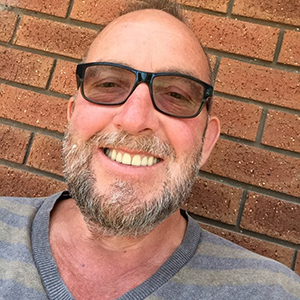Connection after stroke is crucial
By Mike Whittle
As a survivor of two strokes and a heart attack, I have a few words of wisdom I’d like to share this Men’s Health Week.
Firstly, nobody is invincible. Before my stroke, my health was not top of mind. I was a smoker and worked in a highly stressful job. This is not a good combination.
I was in my early 60s when stroke changed my life in an instant.
I went from being a man at the top of my profession to someone with cognitive issues including short term memory loss. I had to learn to read again. This took around six months and was incredibly disheartening for a guy with a literature degree.
I found the transition from hospital to home challenging and lonely at times. While I was lucky to be alive and to have loved ones around me. There is a lot to come to terms with mentally after a major health scare. I felt like I was a different version of myself, and it takes time to adjust.
My rehabilitation journey included learning how to manage my emotions and accept support from others. The most incredible form of support and strength I have found is the connection I have with other stroke survivors. People who simply “get it”.
I now coordinate the Hobart Stroke Support Group. Through this group I have made incredible friendships with people who have had similar experiences. These friends understand me, empower me and give me courage to stay on the path of self-improvement. We feel comfortable together and share tips and different strategies that have helped in our recoveries. You can see the impact a group like this has when a new member comes in. Within weeks they seem brighter and more confident and know they are not alone.
Our partners also benefit from the connections they make with other partners and carers in the group whose lives have inadvertently changed.
The Stroke Foundation’s EnableMe website and social media channels have also been a great source of information and inspiration and connectedness since my stroke and make me feel like I am part of a bigger community.
I am also pleased to be involved with the Foundation’s StrokeSafe Speaker program. As part of this program, I present talks to workplaces and community groups to raise awareness of what a stroke is, how to spot a stroke using the F.A.S.T. test (Face.Arms.Speech.Time) and how to prevent stroke. This gets me into the general community doing something meaningful, something that could actually save a life.
From my experience, it is so important to look after your mental health and get involved in something that brings you joy – however that may look for you. When you combine that with a healthy balanced diet exercise, plenty of sleep (and no cigarettes!) it is possible to thrive after stroke.
If you need advice call StrokeLine on 1800 787 653.

Statistics
- 52% of all strokes each year globally occur in men
- Mood disorders, including anxiety depression, frequently occur following stroke.
- Of the 44% of patients who had a documented mood disorder present following a stroke, less than 50 percent of these patients were assessed by a psychologist.
